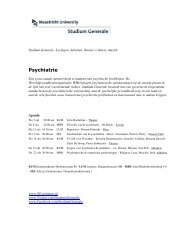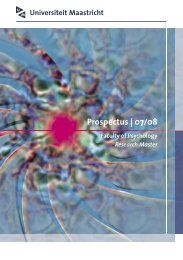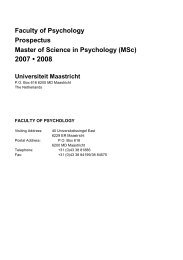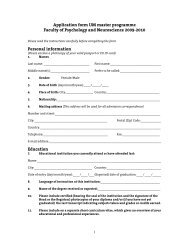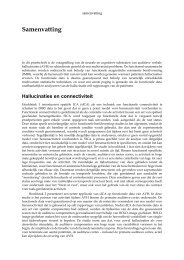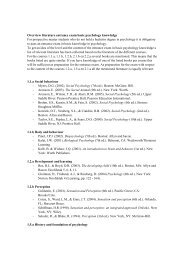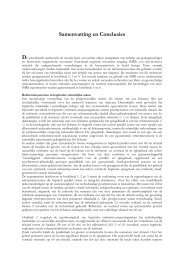Prospectus | 08/09 - Psychology and Neuroscience - Maastricht ...
Prospectus | 08/09 - Psychology and Neuroscience - Maastricht ...
Prospectus | 08/09 - Psychology and Neuroscience - Maastricht ...
Create successful ePaper yourself
Turn your PDF publications into a flip-book with our unique Google optimized e-Paper software.
Chapter 5 - Specialization Psychopathology<br />
• Adaptation to stress: normal psychological <strong>and</strong> biological processes, allostasis;<br />
• Experimental paradigms;<br />
• Does stress cause psychiatric / psychosomatic disorders? Evidence <strong>and</strong> possible<br />
pathways;<br />
• Long-term effects of adverse early experience: what can we learn from animal models<br />
<strong>and</strong> epidemiological studies?;<br />
• Why are some individuals more vulnerable (or more resilient) to stress than others?<br />
Genes <strong>and</strong> environment;<br />
• Post-traumatic stress disorder: controversies concerning the concept of trauma,<br />
epidemiology, biological <strong>and</strong> psychological processes, treatment <strong>and</strong> prevention.<br />
97<br />
Instructional Approach<br />
The seminar consists of interactive meetings, including lectures, group discussions, <strong>and</strong><br />
student presentations.<br />
Form of Assessment<br />
Participation, editorial review, presentation, <strong>and</strong> research proposal.<br />
| 474PP Developmental Psychopathology – 3 credits<br />
Instructor: Kathleen Restifo, Clinical Psychological Science (FPN), Phone 38 81733,<br />
50 Universiteitssingel, Room 1.354, E-mail: k.restifo@dmkep.unimaas.nl<br />
Description of the Course<br />
The aim of this seminar is to introduce students to the field of developmental<br />
psychopathology, an interdisciplinary field which employs the framework of normal<br />
development to underst<strong>and</strong> psychopathology as it unfolds throughout the lifespan.<br />
Developmental psychopathology draws on research from developmental <strong>and</strong> clinical<br />
psychology, behavioural genetics, neurology, neuropsychology, <strong>and</strong> psychiatry among<br />
other fields, <strong>and</strong> attempts to integrate concepts, methods <strong>and</strong> findings from these<br />
fields into models which attempt to explain how psychopathology develops, including<br />
etiological factors <strong>and</strong> causal pathways. The research methods employed can include<br />
cross-sectional or longitudinal designs; normal, high risk or clinical samples, prevention<br />
<strong>and</strong> treatment studies, neurodevelopmental studies, <strong>and</strong> behavioural genetic studies,<br />
to name a few.<br />
The focus of this seminar will be to examine child psychopathology through the lens of<br />
developmental psychopathology. It is not possible to systematically cover all aspects of<br />
developmental child psychopathology in one seminar. Rather, the aims are as follows:<br />
1) Introduce the major theories <strong>and</strong> research methods, <strong>and</strong> the variety of disciplines<br />
involved.<br />
2) Critically analyse recent <strong>and</strong>/or influential research studies in four broad areas<br />
of psychopathology: 1) anxiety, 2) depression, 3) conduct disorders <strong>and</strong> 4) autism.<br />
Treatment approaches will be discussed in the last class.<br />
3) Critically examine competing models of the interaction between etiological factors





